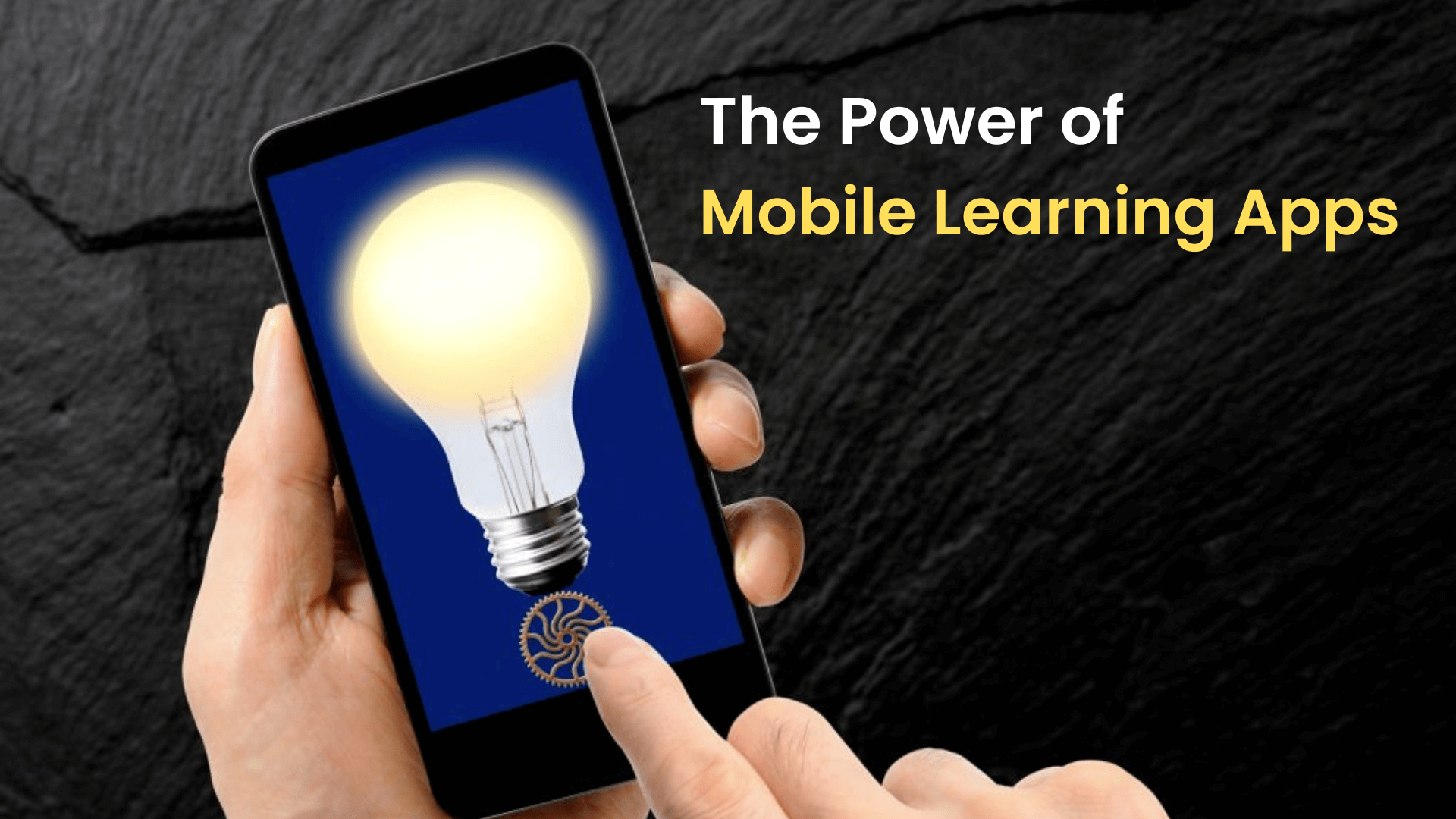Mobile app solutions have revolutionized the way students learn and interact with educational content. With the traditional method of education unable to provide one-to-one attention, students are turning to digital solutions for more personalized learning experiences. The need for learning app development has been on the rise, and it is no surprise given the role advanced technology plays in education.
The mobile education market witnessed an impressive compound annual growth rate (CAGR) of approximately 24% during 2015-2020, indicating a rising demand for innovative learning solutions in the digital age. As per the latest research by the IMRC Group, this trend is set to continue with robust growth projected between 2021 and 2026, pointing towards a bright future for mobile based education.
Today’s students have access to online platforms, eBooks, and interactive resources that allow them to learn from anywhere and at any time. By leveraging mobility, Artificial Intelligence, Blockchain, and Cloud technology, students can receive a personalized learning experience, while educators can focus on individual students’ needs. The entire education system can become more effective with the use of these interfaces.
In this blog, we will delve deeper into the benefits of mobile app solutions for education and explore how they are shaping the future of learning. We will discuss how these apps are transforming students’ careers, allowing for more efficient and effective self-learning, and providing educators with the tools they need to focus on individual student needs. Let’s take a closer look at why mobile app solutions are becoming the go-to for students and educators alike.
How Does Any Mobile App Help?
Mobile apps have become an essential tool for businesses in the competitive world as they help companies reach more customers through smartphones. The development process of mobile apps involves creating software to operate on various mobile devices, including Android, iOS, and Windows. The apps can be downloaded for free or for a fee from app stores and are managed by mobile app owners through an admin panel.
Originally developed for productivity and automation assistance, mobile apps are now used in all industries, including gaming and manufacturing. Companies can create mobile apps for their operations to provide customers with access to their services and products at any time. With the help of the internet, users can use mobile apps to track locations and order products and services.
The Power of Mobile Learning Apps for Education
The digital age has brought a revolutionary change in the way we learn. With the increasing availability of mobile devices, the possibility to access educational material from any location and at any time has become a reality. Mobile learning apps have become a popular choice for learners seeking flexibility, convenience, and accessibility.
Flexible Learning on the Go
One of the greatest advantages of mobile learning is its flexibility. By eliminating the need for learners to be in a specific location at a particular time, online learning has already made education more convenient. Mobile learning takes it one step further by making educational resources, such as videos and podcasts, readily available on smartphones and tablets. This allows learners to access the material anytime, anywhere, and at their own pace.
Improved Retention and Performance
Mobile learning apps use innovative techniques that make the content easier to comprehend, leading to improved retention rates. Moreover, learners already accustomed to their mobile devices, find mobile learning more engaging and fun, leading to better performance. As a result, learners develop a learning habit, which enhances their knowledge and boosts their overall performance.
Multi-Device Compatibility
Mobile learning apps allow learners to access their courses on any device they prefer, from laptops and desktops to tablets and smartphones. This makes training more convenient and enables learners to choose their preferred device based on their personal preference or situation.
24×7 Availability and Remote Access
Mobile learning apps allow learners to pursue their interests anytime and from anywhere on the planet, providing offline and remote accessibility. This flexibility is especially helpful for students living in remote areas or with limited mobility, enabling them to further their education without having to travel or relocate. Moreover, mobile learning apps allow institutions and teachers to communicate with students from all over the world, expanding the reach of education globally.
Enriched Learning Experience and Improved Educational Standards With the help of mobile learning app development, the learning experience can be enhanced, making it more fun and engaging. As teachers themselves also use such applications, it is evident that content through educational mobile applications is preferred. By creating an enriched learning experience, the mobile learning apps can positively impact not only the students but the society as a whole. Mobile learning apps have the potential to increase the reach of education and improve educational standards globally.
Personalized Learning Experience
In a traditional classroom setting, it is challenging for teachers to provide individual attention to all students. However, mobile app-based learning provides a solution by connecting teachers and students on a 1:1 ratio. This personalized approach allows for tailored teaching, catering to each student’s unique needs and challenges. The result is a high-quality learning experience for each student, ensuring they remain motivated and engaged throughout the class.
Improved Communication Channels
AI-ML-NLP-enabled mobile apps in education are bridging the communication gap between institutions and students. These apps allow for instant notifications and alerts to be sent to all students promptly, ensuring they are always up-to-date with important information. This approach is more effective than traditional methods like billboards, which may not be seen by all students. With mobile apps, institutions can confirm that students and parents have received and acknowledged the notifications.
Cost-Effective Education
Mobile app-based learning is a cost-effective alternative to on-campus studies and direct classroom learning. Blended learning is the concept behind this approach, which allows students to leverage mobile app-based lectures both on-campus or remotely. This approach promotes good returns on investment while providing quality education to students.
Modern Learning Techniques and E-Library
Mobile app-based learning employs advanced technology and friendly platforms, facilitating a seamless learning experience for students. Audio/Video teaching modules directly connect with the audience, including students, trainees, and learners. These modules are not only teaching materials but a complete learning process with vast resources, including books, assignments, practical sessions using AR/VR technology, and much more. The result is a modern approach to learning that caters to the needs of today’s students.
Technologies Giving a Major Shift in Educational Market
Mobile app development services have opened up new avenues in the education sector, where technology is transforming the way students learn. Among the innovative technologies being used, Artificial Intelligence (AI) plays a crucial role in personalizing the learning experience. With AI, the educational experience can be tailored to suit individual needs, making learning accessible to everyone.
Virtual Reality (VR) has made significant progress in mobile learning and is becoming a potent tool for online learning. There are VR mobile apps that have successfully been able to educate students about human anatomy by creating an immersive 3D navigation experience. Similarly, Augmented Reality (AR) is being used to create interactive learning experiences that make
learning engaging and exciting.
Chatbots and virtual assistants like Siri and Alexa have made our lives easier, and they are also being used in mobile learning to provide a tailored learning environment for students. Chatbots can help convert lectures into a series of messages, making it easier for students to understand and retain information. Gamification is another technology being used to make learning fun and engaging. By combining learning with entertainment, gamification improves students’ focus and engagement.
Conclusion
The rise of online education and eLearning has led to an increased demand for mobile applications that can provide users with a seamless and engaging learning experience. For educational organizations and entrepreneurs looking to make their courses and modules available on mobile devices, a custom mobile application is the perfect solution. However, creating an effective and competitive app requires a specialized skill set and a thorough understanding of the latest trends and technologies.
You must get in touch with a leading mobile application development company that can understand the unique challenges faced by the education sector when it comes to mobile app development. Their team of experienced developers and designers are well-equipped to handle all aspects of the development process, from ideation to deployment. They work with you to create a custom app that not only meets your specific needs but also delivers a unique and engaging user experience to your students.
Get the top expertise in mobile app development and a deep understanding of the education sector, turn your app idea into a reality and stay ahead of the competition.


